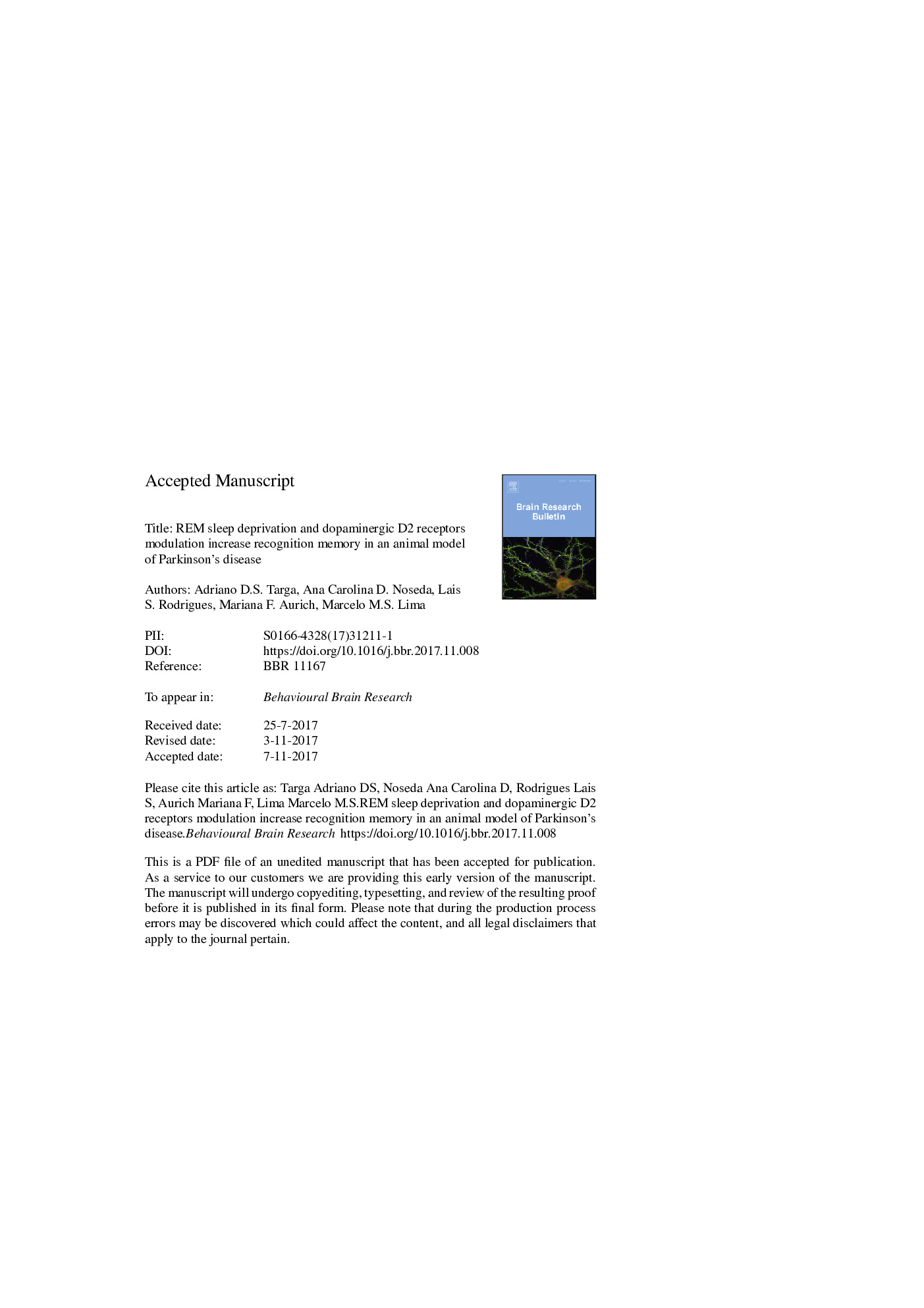| کد مقاله | کد نشریه | سال انتشار | مقاله انگلیسی | نسخه تمام متن |
|---|---|---|---|---|
| 8837979 | 1612896 | 2018 | 31 صفحه PDF | دانلود رایگان |
عنوان انگلیسی مقاله ISI
REM sleep deprivation and dopaminergic D2 receptors modulation increase recognition memory in an animal model of Parkinson's disease
دانلود مقاله + سفارش ترجمه
دانلود مقاله ISI انگلیسی
رایگان برای ایرانیان
کلمات کلیدی
PPTREMSDREBSNpc - SNPCOpen field test - آزمایش میدان بازObject recognition test - آزمون تشخیص شیParkinson’s disease - بیماری پارکینسونParkinson’s disease (PD) - بیماری پارکینسون (PD)substantia nigra pars compacta - توده سیاه پارس متراکمRecognition memory - حافظه تشخیص یا شناختDopamine - دوپامینREM sleep deprivation - محرومیت از خواب REMORT - محلnoradrenaline - نورآدرنالین pedunculopontine tegmental nucleus - هسته تمثالی pedunculopontineD2 receptors - گیرنده های D2
موضوعات مرتبط
علوم زیستی و بیوفناوری
علم عصب شناسی
علوم اعصاب رفتاری
پیش نمایش صفحه اول مقاله

چکیده انگلیسی
Cognitive impairment is an important non-motor symptom of Parkinson's disease (PD). The neuronal death in nigrostriatal pathway is the main factor for motor symptoms and recent studies indicate a possible influence in non-motor symptoms as well. The pedunculopontine tegmental nucleus (PPT) and basal ganglia are closely related anatomically and functionally and, since they are affected by neurodegeneration in PD, they might be involved in recognition memory. To investigate this, we promoted an ibotenic acid lesion within the PPT or a rotenone lesion within substantia nigra pars compacta (SNpc) of Wistar rats, followed by 24 h of REM sleep deprivation (REMSD). Then, we administered a dopaminergic D2 receptor agonist (piribedil, 3 μg/μl), antagonist (raclopride, 10 μg/μl) or vehicle (dimethylsulfoxide) directly in the striatum and the animals were submitted to the object recognition test (ORT). We observed that raclopride administration impaired object recognition memory as well as rotenone and ibotenic acid lesion. Interestingly, REMSD reversed the deleterious effects induced by these drugs. Also, raclopride administration after rotenone lesion allowed the animal to explore the new object for a longer time compared to the familiar object, suggesting that raclopride has a dual effect, dependent of the treatments. These findings suggest a role for PPT, SNpc and striatum in recognition memory and points the D2 receptors modulation and REMSD as possible targets for cognitive deficits in Parkinson's disease.
ناشر
Database: Elsevier - ScienceDirect (ساینس دایرکت)
Journal: Behavioural Brain Research - Volume 339, 26 February 2018, Pages 239-248
Journal: Behavioural Brain Research - Volume 339, 26 February 2018, Pages 239-248
نویسندگان
Adriano D.S. Targa, Ana Carolina D. Noseda, Lais S. Rodrigues, Mariana F. Aurich, Marcelo M.S. Lima,